Strengthening Joy in Trying Times
Pulling joy out of life to meet the challenges of the changing world order
Dear one,
I hope this finds you at ease. I am writing to you today from crisp and chilly New York with one thing on my mind: joy. A few months ago, while meditating on retreat at Hidden Valley, I was reminded of a timeless truth. As I steadfastly watched my in-breath and out-breath, I noticed how, despite being short-lived, each breath was essential in sustaining the functioning of this body that I call “me.” In that moment, I watched an insight arise in my heart-mind: one day, this breath, too, will cease.
The Buddha called this truth of existence anicca, or impermanence. At first, I felt a pang of discomfort arise in the body—sensations that indicated aversion, fear, and even denial. However, as my heart-mind came to accept the truth of this body’s mortality, I found my body feel peaceful, tranquil. Upon opening my eyes, the fragrance of the jasmine blooming in the garden became ever more luscious. The chirping of the songbird, a prayer. And the vast clear skies felt like an embrace not only of my body, but of everything that’s carried within it: memories, experiences, dreams, ambitions, and, most strikingly, love.
To say that we are living through trying times feels like I am minimizing the gravity of the lies, corruption, deceit, greed, suffering, violence, and death we are witnessing. The death of ecosystems lost to fires and floods. The death of jobs and livelihoods. The death of the ideals of pluralism and multiculturalism. The death of law and the rules of engagement. The death of certainty. And possibly the death of a familiar international world order. As I feel these words in my own body, I notice how all of this is a lot for a tender, sensitive, and empathetic body to hold.
In response, my mind asks: but why? Why is it so difficult for my heart, mind, and body to hold this? Our ancestors did it. Our human relatives around the world from Venezuela to Mali to Myanmar do it. Our living-kin, plants and animals, do it. They are no different from us. They, too, breathe that same air that gives each of us the gift of life. This is what I want to explore with you today, but more than this, I want to share essential actions that trying times are calling each one of us to take.
Acknowledging a certain bias as the starting point

One thing I’ve begun to acknowledge about the current state of human consciousness is that we’ve built cultures and systems that are death-phobic. Not only are most of us uncomfortable with the idea or thought of death—just as I was during my meditation—but we’ve actively organized our lives to circumvent or even deny its existence. As someone who came very close to death, I’ve noticed that talking about death brings awkward lulls in conversations and triggers emotions and sensations that people are ill-equipped to handle.
This is my invitation to you. This invitation is the starting point for us to march up to freedom land and to brew a new vision for our future. I think of my fearless ancestors in India who fought the brutality of the British Raj, or the leaders of the Civil Rights Movement or the anti-Apartheid struggle. They looked death straight in the eye and said: bring it on.
If you read Chapter 2 of Breaking Bias, you’ll know that capitalist modernity (the last 500 years) has not worked for the vast majority of life. And the death that we are witnessing all around us is the old guard dying through self-destruction. Our task now is acceptance of this death, with compassion for our suffering and the suffering of all life. This practice helps us connect to the other truth of existence—ubuntu or interdependence and interbeing.
Once I accept that the structures and systems I once held as familiar no longer are, or will no longer be, I can release the expectation for them to be a certain way. This opens up the space for me to use my gifts, talents, and values to conjure up new visions for what can be. I am no longer imprisoned by the old psychopathic ways of being. Such acceptance isn’t a one-time destination that we get to and move on. Rather, it is a moment-to-moment journey that requires us to acknowledge, feel, and grieve the loss of the familiar.
This is our task, dear ones. With such emotional and spiritual labor, we will be tilling the soils of our souls to do two things. First, to imagine new ways of being with ourselves and one another that betray the transactional and commodified relations that stifle the life force within and around us. Second, as my friend Qinza and I say in Hindi and Urdu, zindagi se khushiyaan kheenchon: forcefully pull joy out of life.
Pulling joys out of life
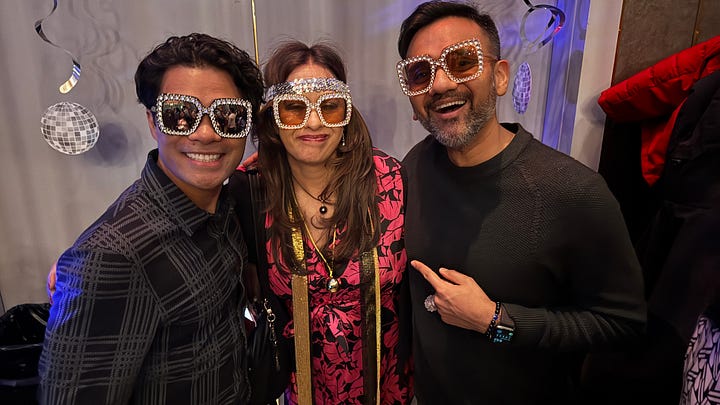
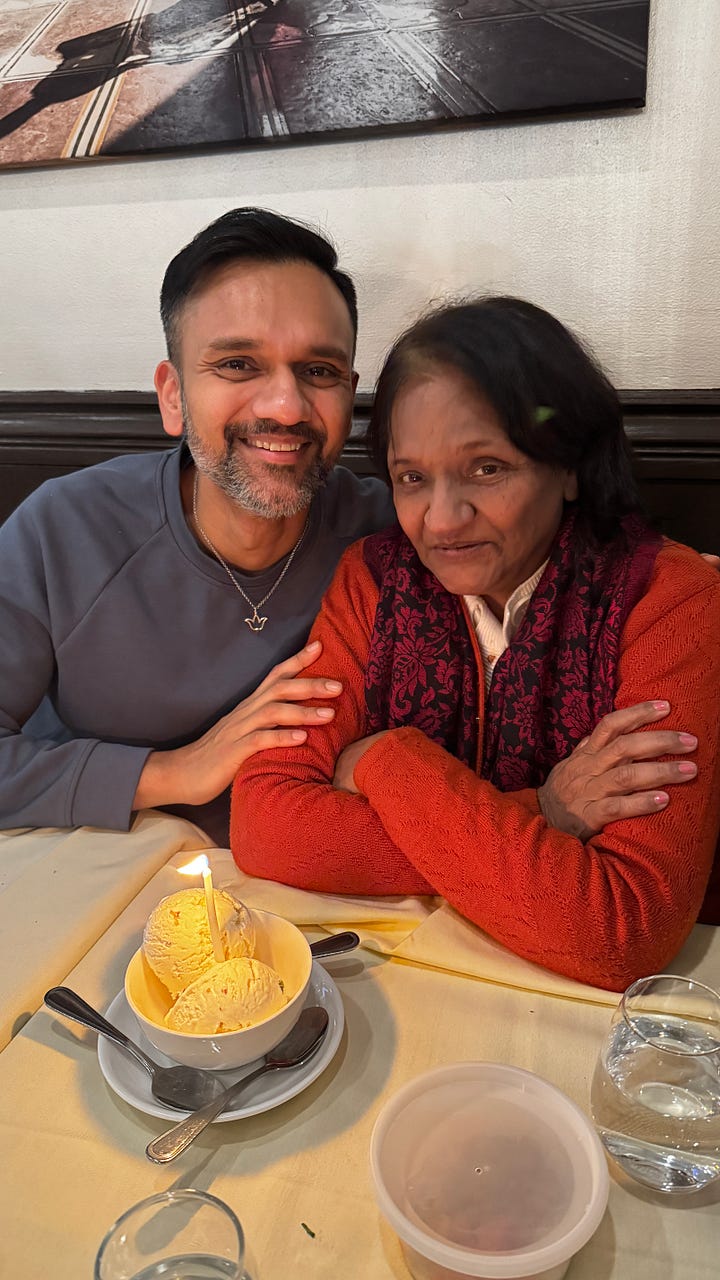
Over the last 500 years, members of our species have designed many material things to make our daily life more comfortable and easeful. Yet, we find ourselves busier, more stressed, and unhappier than ever before. The problem isn’t with the gadgets and conveniences of the 21st century, but where we place our attention. We have been conditioned to draw our attention outside of us—to ideas, thoughts, opinions, and happenings out there—at the very expense of ourselves, of what’s happening within the most important person in our lives: the human that’s right here, breathing.
Last weekend, I went to a friend’s birthday party. My friend, who is a passionate civil rights lawyer, thoughtfully prepared parting gifts for everyone who attended the party. We were each handed bags that read, “Happy Black History Month.” In them, we found magnets and stress balls that reminded us that “You are fearless” or “You are smart, beautiful, and courageous,” alongside a copy of the American Constitution. In the past, my distracted mind would not have thought twice about it. This time, however, I could feel her joy, passion, courage, and love as I emptied my bag at home. A tear rolled down my cheek as I fully received her gifts and thought of the 100 or so people now interconnected with these same joys.
The next day, my partner and I had a small birthday celebration for my mother. We took her to our neighborhood Indian restaurant. In passing, I mentioned to the server that it was her birthday, so he brought the dessert with a little candle for her to blow. And right after that, he played an old Bollywood happy birthday melody that I hadn’t heard in decades, one that my mother cherished. I couldn’t have planned the day to be any better, and there it was—perfect. These are the inexplicable joys of life that we can savor when we pay attention.
For the next couple of weeks, this is my invitation to you: to tend and befriend the grief while savoring the joys of life.
In the Buddhist tradition, there is a famous phrase that says our lives are filled with 10,000 joys and 10,000 sorrows. The phrase reminds us that life is filled with an equal measure of both happiness and suffering and encourages acceptance of both experiences as part of the human condition. As we acknowledge the grief and sorrow of our trying times, let’s not forget to also embrace the joys fully.
Where are you noticing joy these days? Share with me below!
Breaking Bias with Beloved Communities
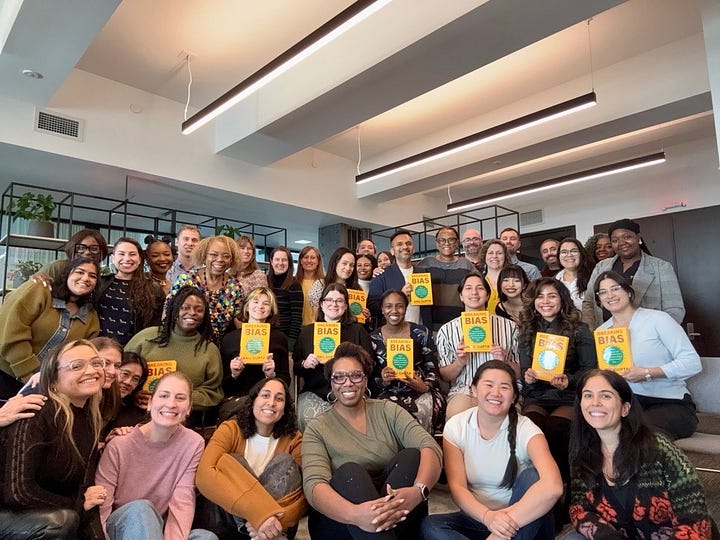
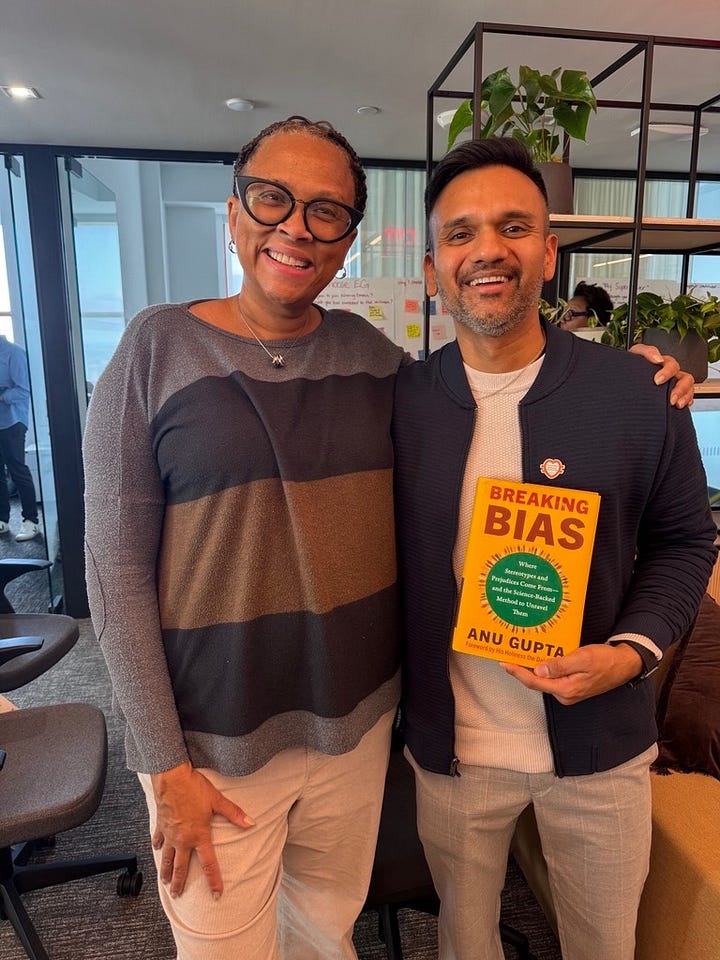

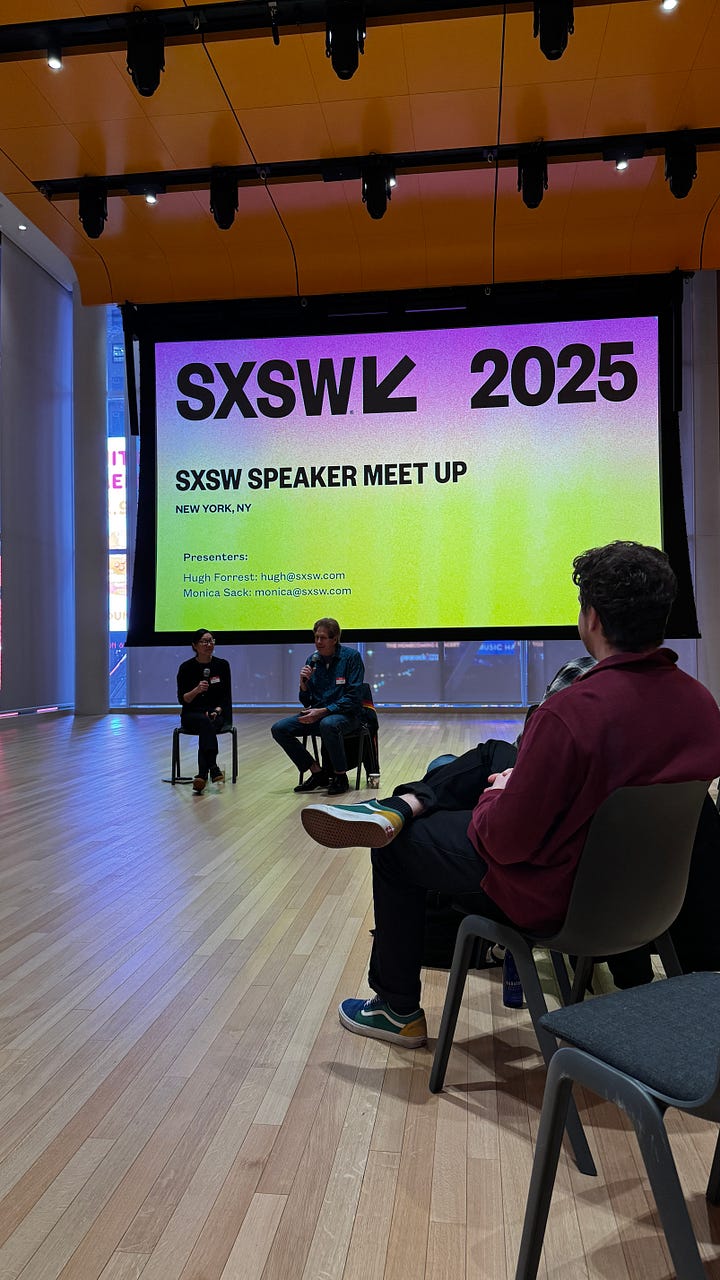
I was grateful to be in conversation with hundreds of people around Breaking Bias over the past few week!
I was honored to participate in Echoing Green’s staff retreat, where I was in conversation with their incredible leader, Cheryl Dorsey, about resilience, courage, and healing in these times. I was deeply touched by the struggle some team members shared about navigating relationships with loved ones who’ve checked out—and how we are still called to accept their decision and hold them with compassion.
I was so happy to be in conversation with Raghu Marcus of the Ram Dass Foundation about dealing with hatred and prejudice. You can watch the full conversation here and hear me chant the Gayatri Mantra in Sanskrit (something I’ve never done on camera before!).
Breaking Bias also made its way to HSBC UK, where I led a masterclass on internalized bias for lawyers and bankers, as well as to the Cathedral School in NYC, where teachers and parents are engaging with its content to support children in finding self-love and acceptance.
I’ll be speaking at SXSW and Austin from March 11–15! Are you in Austin? Drop me a line at info@bemorewithanu.com, and I’ll add you to my guest list.
Please leave your 5-star review of Breaking Bias
Thank you to those of you who took the time to leave a five-star review on Goodreads and Amazon. If you haven’t yet, please leave a five-star review! Our goal is to get to 100, and we’re just under halfway there. Thank you!
Media I’ve been consuming…
Neurons that fire together wire together. At a time when our attention is sucked into “breaking news media,” it’s imperative that we place our attention on stories that strengthen our hope, compassion, joy, and generosity. While there is no shortage of positive media out there, I want to point out the following two because they were inspiring and entertaining—and spoke directly to Breaking Bias. You can check out last week’s recommendations here if you missed them.

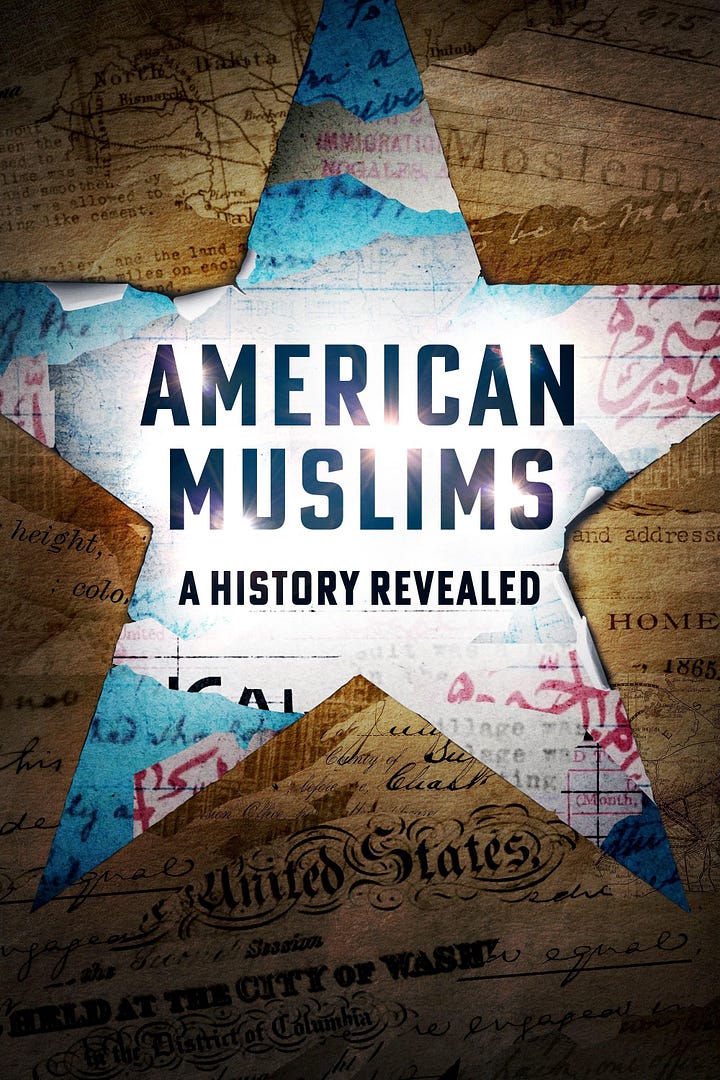
Australia Unmasked with Miriam Margolyes. Former Harry Potter star, recent Australian citizen, and self-proclaimed “Fat Jewish Lesbian” Miriam travels across Australia on a mission to explore the unique Australian ethos of the “fair go.” This is a wonderfully shot docuseries that gets to the core of the challenges of migration, immigration, race, and our unreckoned history of colonization and empire. Across the three-episode Netflix series, you’ll meet a diverse cast of characters and explore the extraordinary lives of her fellow citizens.
American Muslims: A History Revealed is a six-part PBS documentary that unearths the deep roots of Islam from the very founding of the United States. With captivating storytelling and rigorous historical research, the documentary shows how interdependent and interconnected the idea of America has been with the peaceful and compassion-based practices of Islam. The documentary is filled with portrayals that support us in stereotype replacement and help to shift hearts and minds away from dominant, negative portrayals of this diverse segment of humanity.
Thank you for reading! As you know, to increase access, I have removed the paywall on my content. However, if you’re financially able, I’d love for you to consider becoming a paid subscriber.
I’ve recently seen a 75% decline in income, so your financial support can make a real difference in powering our movement of belonging.
As a gesture of appreciation, when you subscribe, you’ll receive free access to my Masterclass on Mental Health, Cultural Diversity & Wellbeing, which features powerful, transformative insights from over 20 thought leaders.
Some housekeeping…
If you received this from a friend and liked what you read, please subscribe now!
Want to stay connected throughout the week? Engage with me on Instagram and LinkedIn, and subscribe to my content on YouTube.





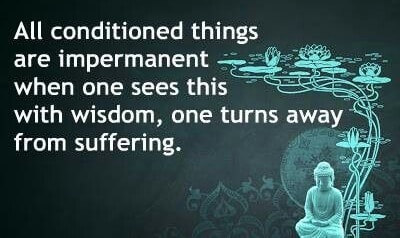
Thank you Anu for your beautiful writing and wise perspective. I felt joy in my morning meditation as I realized I have a full day in which to live as I choose. This is such a beautiful reminder to feel my joy fully just as I feel compassion for those who are suffering in our society and our world today. I hold my joy and pain tenderly.
What a beautiful and moving piece. It gives me hope and is a good reminder of what we are built to endure…animals for instance. Thank you and keep sharing your gifts and spreading hope.